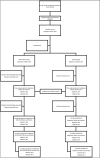The effectiveness of using a WeChat account to improve exclusive breastfeeding in Huzhu County Qinghai Province, China: protocol for a randomized control trial
- PMID: 31791295
- PMCID: PMC6889429
- DOI: 10.1186/s12889-019-7676-2
The effectiveness of using a WeChat account to improve exclusive breastfeeding in Huzhu County Qinghai Province, China: protocol for a randomized control trial
Abstract
Background: An exclusive breastfeeding rate in the first 6 months of life of at least 50% is one of the six World Health Organization global nutrition targets for 2025. However, the exclusive breastfeeding rate in China is quite low and decreasing which makes it urgent to explore effective ways to reverse the current downward trend. As mobile technologies have rapidly developed, mobile communication apps such as WeChat (one of the largest social networking platforms in China) are well accepted and have the potential to improve health behaviors in a convenient way. The current paper describes the study protocol of a WeChat intervention that aims to promote breastfeeding in rural areas in China.
Methods: The study is designed as a randomized controlled trial in rural Qinghai Province, China. Women who are 14-36 weeks pregnant will be randomized to routine antenatal and postnatal care, or routine care plus the WeChat breastfeeding education. pregnant women with a severe disease and complications of pregnancy or HIV-1 will be excluded. Breastfeeding knowledge and promotion information will be delivered to the intervention group through a WeChat official account from 3 months pregnancy to 6 months postpartum. The outcome assessments are conducted at baseline through face-to-face interviews, and at one week, 1 month, 3 months and 6 months postpartum by telephone interviews. The primary outcome is difference in the exclusive breastfeeding rate at 1 month, 3 months, and 6 months postpartum between the intervention group and the control group. Secondary outcomes include the overall duration of any and exclusive breastfeeding across the first 6 months postpartum; mothers' knowledge of breastfeeding; the proportion of early initiation of breastfeeding; and the timing of the introduction of solid food to infants. Intention-to-treat-analysis will be used. Survival analysis will be used to compare the overall duration of any and exclusive breastfeeding between groups.
Discussion: This study is the first effort to promote exclusive breastfeeding through WeChat in China. Our results will provide scientific evidence for the effect of health education through WeChat on breastfeeding. Thereby this may offer a comprehensive intervention to promote exclusive breastfeeding in China and other settings.
Trial registration: Chinese Clinical Trial Registry -ChiCTR1800017364. Registered 26 July 2018. http://www.chictr.org.cn/showproj.aspx?proj=29325.
Keywords: Breastfeeding; Exclusive breastfeeding; Mhealth; Randomized controlled trial; WeChat.
Conflict of interest statement
The authors declare that they have no competing interests.
Figures


References
-
- World Health Organization: Global Targets 2025. 2017. https://www.who.int/nutrition/global-target-2025/en/
-
- Victora Cesar G, Bahl Rajiv, Barros Aluísio J D, França Giovanny V A, Horton Susan, Krasevec Julia, Murch Simon, Sankar Mari Jeeva, Walker Neff, Rollins Nigel C. Breastfeeding in the 21st century: epidemiology, mechanisms, and lifelong effect. The Lancet. 2016;387(10017):475–490. doi: 10.1016/S0140-6736(15)01024-7. - DOI - PubMed
-
- World Health Organization, UNICEF: Global strategy for Infant and Young Child Feeding. WHO, UNICEF. 2003.
-
- World Health Organization: Infant and young child feeding counseling: an integrated course. In. WHO. 2005.
Publication types
MeSH terms
LinkOut - more resources
Full Text Sources
Medical
Research Materials

